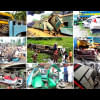Golden Hour in the lives of accident victims

In emergency medicine, "Golden Hour" refers to the immediate one-hour time period following a traumatic injury, during which, chances of preventing death by way of prompt medical treatment are the highest. The phrase was first introduced when soldiers were being provided with emergency medical aid at the close of World War II and the Korean conflict.
When it comes to providing emergency medical services to road crash victims, there is a similar connotation as indicated by countless studies. They indicate that the single most prevalent cause of death for road crash victims is blood loss, mainly from failing to provide life saving treatment immediately to the victim, which illustrates the vital need for institutional preparedness supported by an emergency response mechanism.
The first death from road crash was recorded in 1896. It was said at the time that "this must never happen again." But more than a century later, the World Health Organisation's (WHO) data shows that 1.25 million people are killed from road accidents every year and as many as 50 million are injured. Road accident ranked the 11th leading cause of death, accounting for 2.1 percent of all deaths globally and the second leading cause among people aged 5-29.
Without coordinated and sustained measures, WHO predicts that road accidents will become the 7th leading cause of death by 2030. WHO data also showed that road accidents cost most countries 3 percent of their annual GDP and are increasingly straining their healthcare budgets. In Bangladesh, there are debates over the number of death from road accidents where media reports suggest higher numbers of casualties compared to government figures. SDG 11 calls for providing "access to safe, affordable, accessible and sustainable transport systems for all, improving road safety, notably by expanding public transport, with special attention to the needs of those in vulnerable situations, women, children, persons with disabilities and older persons" by 2030.
But challenges for managing the "Golden Hour" are enormous, starting from getting timely information about the crash itself to responding quickly and properly. Unfortunately, both private and public hospitals in South Asia, including in Bangladesh, are negligent in providing emergency services to road crash victims. Additionally, bystanders who could render help to survivors fear legal consequences, harassments and repeated police interrogation which makes them reluctant to act as Good Samaritans. Worldwide, there is legislation to protect the Good Samaritan which we are yet to adopt.
Responding to a Writ Petition of BLAST, on February 10, 2016, the Bangladesh High Court also issued "Rule Nisi," asking the Director General of Health Services & Secretary of Ministry of Health, Ministry of Road Transport and Bridges and Bangladesh Medical and Dental Council to come up with the necessary guidelines that would make it mandatory for public and private hospitals to provide emergency medical services to survivors of any road accidents. The High Court directive observed that the "failure of the said agencies to ensure emergency medical services by hospitals and doctors for patients in a life threatening situation particularly following a road crash is in violation of the fundamental rights guaranteed under the Article 27, 31 and 32 of the Constitution, read with Articles 15(a) and 18 and 21."
Though the responding parties were supposed to act within four weeks, the concerned authorities are yet to finalise any of the required guidelines. It is evident from a BRAC study that road crash fatalities can be minimised through judicious and timely actions. The proposed Road Transport (draft) Act 2017 has made the owner, company, driver or any other representatives of the vehicle involved in an accident accountable for the transportation of the injured to a nearby hospital and for paying the necessary treatment costs. In addition, Article 48 (3) of the said (draft) Act states that "Bangladesh Police will introduce toll free phone number to inform about any road crash seeking emergency rescue and medical services."
Representatives of transport owners and workers have opposed the proposal arguing that in the event of most road accidents, it is the drivers, conductors and helpers who become the victims, as owners are, more often than not, missing from the spot. But road safety experts have suggested that transport owners should set up central mechanisms to monitor road accidents around the clock to inform the concerned authorities—a prerequisite for managing the "Golden Hour."
Social attitudes also play a big role in influencing the behaviour of drivers. Often it has been observed that drivers try to flee the spot to save themselves from the public's anger. The habit of immediately accusing drivers, according to research, has been identified as the primary obstacle to conducting proper investigations, etc. Professor Shamsul Hoque, Department of Civil Engineering, Bangladesh University of Engineering and Technology, who is also an expert on road safety, has carried out some eye opening research related to a few cases of road accidents in Bangladesh, which shows that in some cases, neither party involved in a crash were responsible, rather that it was the circumstances that had been the main cause.
So to truly hold drivers accountable when it comes to providing the mandatory support following an accident, social attitudes must change. This requires a nationwide campaign involving all the stakeholders. In addition, the Road Transport and Traffic (draft) Act 2012 proposed earlier made it mandatory for any vehicle passing by an accident to transport the injured to a nearby hospital, which the current draft excludes. This should be reincorporated and, most importantly, once they are brought to hospitals, the capacity to render emergency medical services becomes crucial and hence, must be assured.
Thus, to make the best use of the "Golden Hour", an institutional framework is required, which should include, among others, these issues: i) Emergency medical service providing agencies and institutions should not only be made accountable to respond during crisis moments, but should also take suitable measures to enhance their skill and capacity; ii) Community based response mechanism needs to be developed including adequate training of the members of road safety committees who will be working as part of a "designated trusted team" member to find out the facts and facilitate producing the first report within fifteen minutes; iii) Analysing the extent of the road crash "designated trusted team" should be capacitated for taking critical decisions at the shortest possible time; iv) Transport owners, agencies or authorities should develop a mechanism to monitor road accidents across the country around the clock; v) Separate legislation should be enacted to protect "Good Samaritans"; and vi) A national database should be developed and maintained to record deaths and injuries from road accidents.
Sadrul Hasan Mazumder is the Programme Coordinator, Advocacy for Social Change, BRAC and Coordinator, Safe Road and Transport Alliance (SROTA).
E-mail: [email protected]









Comments